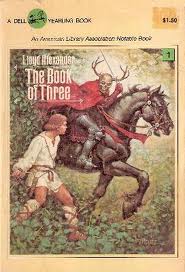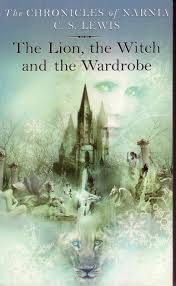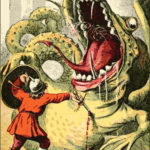Satan Is For Real, Or What Became Of The White Witch?
 The Horned King, Lord Foul, Sauron, the White Witch. Fantasy literature is ripe with supreme antagonists who fight against good, in the same that Satan fights against God. Unless it’s my imagination, however, we’re seeing less of Satan in Christian speculative fiction. His minions still make frequent appearances, but he’s not as visible as he once was.
The Horned King, Lord Foul, Sauron, the White Witch. Fantasy literature is ripe with supreme antagonists who fight against good, in the same that Satan fights against God. Unless it’s my imagination, however, we’re seeing less of Satan in Christian speculative fiction. His minions still make frequent appearances, but he’s not as visible as he once was.
As it happens, this trend mirrors society. Fewer and fewer people in the West, including Christians, believe Satan exists. According to a 2009 survey conducted by the Barna group, only 35% of those professing Christ also believe Satan is a real person:
Four out of ten [self-described] Christians (40%) strongly agreed that Satan “is not a living being but is a symbol of evil.” An additional two out of ten Christians (19%) said they “agree somewhat” with that perspective. A minority of Christians indicated that they believe Satan is real by disagreeing with the statement: one-quarter (26%) disagreed strongly and about one-tenth (9%) disagreed somewhat. The remaining 8% were not sure what they believe about the existence of Satan. (“Most American Christians Do Not Believe that Satan or the Holy Spirit Exist,” emphasis mine)
How convenient for him. It’s hard to fight an enemy you can’t see and even harder to fight one you think is merely a symbol of the wrongs of the world.
A more recent, 2013 survey shows the number of Americans who believe in Satan to be somewhat higher than the Barna Group’s findings, though what these people mean by “Satan” is not defined.
The survey by YouGov found that 57 percent of respondents believe that the devil exists . . . Sixty-three percent of people with a high school education said they believe in the evil spirit compared to 48 percent of college graduates. (“Majority of Americans believe in the devil – especially Republicans, blacks and women”)
 Even those who believe in a real devil may not have an understanding of him that’s consistent with Scripture. Apart from the red tights, horns, and pitchfork, a popular notion of Satan is that he is the ruler of hell. In contrast, the Bible teaches that hell is the place God will send Satan as punishment for his rebellion.
Even those who believe in a real devil may not have an understanding of him that’s consistent with Scripture. Apart from the red tights, horns, and pitchfork, a popular notion of Satan is that he is the ruler of hell. In contrast, the Bible teaches that hell is the place God will send Satan as punishment for his rebellion.
What Satan is up to, what he’s trying to accomplish, remains under a greater cloud of confusion. Culture has him pictured as an evil influencer, the worst side of our nature, the one behind demon possession. These contain some truth but are limited in scope. Satan’s great goal from the beginning has been to overthrow God’s rule. In other words, he’s a rebel who wants to take God’s place.
His first strategy after his removal from heaven along with the angels who followed him remains his greatest ploy—to wrest God’s creation from His control. Hence, his temptation of Eve in the Garden continues to be his greatest temptation of us today. In short, Satan calls into question God’s word. His question to Eve was, “Indeed, has God said, ‘You shall not eat from any tree of the garden’?” (Gen. 3:1b). His question to us today is, Does the Bible really mean . . .
In the same way that Satan attacks God by questioning His word, he calls into question who Jesus is, the One who Scripture identifies as God’s Logos or Word (John 1:14). Not a coincidence, I don’t think, that Satan is called the father of lies. His “chief end,” if you will, is to distort God’s truth.
 God’s creation, for example, was good, by His own testimony. So Satan perverted it. God says He loves the world so much He gave His only Son. Satan says God actually is an unjust tyrant or an uncaring, distant force or an impotent bystander or irrelevant or nonexistent—certainly not a Lover of the souls He created.
God’s creation, for example, was good, by His own testimony. So Satan perverted it. God says He loves the world so much He gave His only Son. Satan says God actually is an unjust tyrant or an uncaring, distant force or an impotent bystander or irrelevant or nonexistent—certainly not a Lover of the souls He created.
Above all Satan wants people to shrink their view of God. That’s his great lie: God is not so great after all.
The corollary that accompanies that lie suggests God’s creatures are worthy of worship. Satan tried to bargain with Jesus for His worship, which is the epitome of what he wants. But he also suggests humans do the same thing. Hence he told Eve if she ate of the forbidden fruit she would be like God.
That temptation is with us today in the relativistic interpretations of Scripture. By isolating verses from the whole, the Bible can be made to say whatever a person wants it to say—resulting in precisely the kind of “Did God say . . .” questioning Satan introduced to Eve, and the “you are God” control he suggested.
 Satan, of course, also stands against the Church of God and particularly against the spread of the gospel. He fights to prevent answers to prayer, puts obstacles in the path of those preaching God’s Word, gives thorns in the flesh, encourages believers to lie to the Holy Spirit, accuses the brethren before God, and is behind false teaching in the Church. He is, after all, prowling like a roaring lion, seeking someone to devour.
Satan, of course, also stands against the Church of God and particularly against the spread of the gospel. He fights to prevent answers to prayer, puts obstacles in the path of those preaching God’s Word, gives thorns in the flesh, encourages believers to lie to the Holy Spirit, accuses the brethren before God, and is behind false teaching in the Church. He is, after all, prowling like a roaring lion, seeking someone to devour.
It’s a little troubling to me, then, that Satan, who is not equal to God but is surely opposite, has taken a back seat in much of our Christian speculative literature. Yes, demonic forces or their equivalent serve as antagonists, though corrupt or evil humans seem more prevalent. But Satan? Off hand, I can only think of one series that has a credible White Witch to oppose its Aslan. But perhaps I’m forgetting others or have missed reading them. Or perhaps we’re not writing about Satan because we no longer believe in him. What do you think?












































I hadn’t thought of this trend – but I had noticed that there is an increasing tendency in the books I’ve come across to have angelic forces opposing the demonic but no real ‘God’ figure at all. No Aslan, no Eru Iluvatar. In many ways, I find that more troubling.
Anne, I agree with this also. I think many writers have backed off from showing God because “allegory” has gotten a bad name and too many think the only way we can show God is through allegory.
I won’t pretend it’s easy, but we do indeed need stories with other Aslans.
Becky
The vampire’s strength is that no one believes he exists, Van Helsing warns us in the immortal Bram Stoker’s Dracula. So too the Devil. This is indeed a troubling trend, particularly in light of scripture and in some stories where it appears “g-d” is not strong enough to really rid us of the evil. Because the same evil keeps coming back. And back. And back. This too makes Satan appear more powerful than the One he hates and seeks to dethrone and supplant, if he could. Again, thank you for showing us God’s Truth and calling us to account. I hope the community is listening.
HG, that’s a great point to illustrate what I’m saying in this article. I find it fascinating that we don’t deny evil but when it comes to battling it, we reduce the fight (often, but not always) to one against humans and/or demons (or those representing them), as if Satan isn’t the one plotting and planning and doing all he can to take God’s place.
Becky
You actually WANT more books with Satan as the bad guy? I purposely avoid those because Satan is the ultimate mustache-twirling cliche. “Mwahaha! Nothing can stop me from defeating God’s Chosen this time! Mwahaha!”
Kessie, Satan is not a cliché and he doesn’t have to appear as one in fiction either. The White Witch is certainly not the “the ultimate mustache-twirling” bad guy. She is surprising on many levels and doesn’t show herself as an enemy at once. Sauron hardly shows himself at all, but clearly, his appearance is horrifying and leaves no doubt that his intent is to devour.
Good Satan figures would make our Christian speculative fiction stronger, I am suggesting. And I think the series I have in mind which does in fact have a strong Satan figure illustrates my point.
Becky
I’m going to have to agree with Kessie on this one. Actually, I think there’s too much “demons/bad spirits/angelic warfare” in Christian spec fic across the board. I believe not because these elements are bad in and of themselves, or because I don’t believe in Satan, or because I don’t think in the right hands such stories can be meaningful. I just don’t think we should make this plot the main point in every single story. Often this element consumes the book to the point that the actual main characters become secondary to their own story. It also becomes a crutch whereby we don’t have to dislike anyone’s choices (because “the devil made them do it”).
Actually, if we look at the examples Beckie describes, the “Satan” character is not in the story very much. The White Witch is present more than Sauron, certainly, but neither are what I would see as principal movers of the story. We don’t spend long moments focusing on them or learning more about them: the emphasis is squarely on the main characters (the Fellowship or the Pevensies), their choices, their decisions. One of the weaknesses of the film adaptions that many have complained of is making these “bad guys” too prevalent in the story (as can be seen in Voyage of the Dawn Treader and The Hobbit: Desolation of Smaug).
Getting back to the ultimate source of our own “myth,” Satan himself doesn’t make much of an appearance in the books of the Bible. He appears as the serpent in Genesis, he tempts Job, he’s referenced occasionally in the Psalms and the Prophets, he tempts Christ in the Gospels, and then is defeated in Revelation. Otherwise, the Bible doesn’t dwell too much on him; it took many years of Church legend developing, and the addition of Milton’s Paradise Lost, to give us the modern importance of this character. Jesus only fleetingly mentions Satan in his teachings, occasionally utilizing a “stand in” for Satan in some of his parables, but as often as not the stories don’t include in specific reference for him. Usually the metaphors are about people, specifically the nation of Isreal, and their disobedience.
Jesus didn’t spend a lot of time trying to convince the people of his day to fear Satan. He did spend a lot of time telling them to repent of their own sins. If anything, I think Christian spec fic should spend far more time grappling with the faults prevalent within the Church rather than the angelic host.
I’ll not disagree with that, Michelle. It’s Satan, not demons, who I think has grown scarce.
And you’re absolutely right to point out the limited role the Satan characters take in the novels that have them. He is more the puppet master pulling strings, the commander-in-chief organizing the troops. But there’s no mistaking–when Gandalf and co. fight against the orcs, they are fighting because they don’t want Sauron to win.
I’ll disagree with you that church tradition or Milton’s legend has made Satan important today. I think Scripture does that clearly, without dwelling on him. Peter called him a roaring lion seeking someone to devour (1 Peter 5:8); John refers to him as the Accuser of the brethren (Rev. 12:10); Paul points out that Satan disguises himself as an angel of light (2 Cor. 11:14), identifies several of his tactics (2 Co. 2:11 and 1 Cor. 7:5), states that Satan hindered him in his plans (1 Thess. 2:18), and identifies his own suffering as “a messenger of Satan” (2 Cor. 12:7). Clearly these first century pillars of the faith saw Satan as an active enemy.
I think our fiction today ignores him more than it does anything else.
Becky
I didn’t meant to imply the Bible doesn’t have Satan or deal with him, only that, as you said yourself, it doesn’t dwell on him. The Bible’s purpose is not to make him important; in fact, I think making him too big or powerful a character has the potential to make the fight too “equal.” God and Satan are not equal: he is not all powerful, he is not capable of creating, and as Christians we know that he has already been overcome. I’m not saying “get rid of,” only that I don’t see any need to give him more attention, especially if it supplants the actual characters in the story. Now if the story is meant to be about Satan and angels, that’s another matter.
Thanks for the article — I was not aware that some considered the devil a “symbol.”
Maybe the whole point is not to count the number of demons vs. angels in our stories, but to make sure that when writing about your heavenly host, make sure Satan has an army too. It’s all about balance. The victory against evil should be a battle worth fighting, rather than a given (because the reader never really sees the manifestation of everything that’s gone wrong).
Stories that grapple with problems within the Church are important, but so are the classic evil vs. good stories. Despite all its trippiness, the book of Revelation is an excellent good vs. evil account, with definite good guy(s) pitted against the eternally evil bad guy.
J. M. I was pretty stunned by the large number of people who self-identify as Christians who don’t believe Satan is an actual person. I don’t know if that’s a result of a lack of teaching in the Church or a lack of study of Scripture by those individuals. The article does give information indicating something like 12%, or maybe 18%–I forget just now–of those don’t define “Christian” as a believer in Jesus Christ as the Son of God and their Savior. Still, that leaves a big number of people claiming Christ as Savior who do not believe Satan is real. A much bigger number than I would have guessed. It’s sobering.
In the end, I think the problems in the Church stem from a lack of knowledge of God’s Word. And as it happens, that’s Satan’s biggest ploy!
Becky
I don’t agree: the battle between God and Satan is not balanced. It is decidedly stacked in God’s favor. In point of fact, as Christians we believe the victory is a given. It’s not a battle worth fighting because of who we defeat, but who we serve. Had Satan never rebelled, we would still be responsible before God for our actions, and God would still be worthy of our love and worship.
Thank you, Becky, for encouraging us, and keeping us sharp in the Lord. My latest novel has a demon as a main character, and reading other Christian blogs, I’m sometimes left thinking my work is too Christian! You are always an encouragement.
Thanks for your kind words, Sarah. Glad you found this article encouraging.
Becky
I’m surprised no one’s mentioned Nephilim yet. They’re the Christian variant on paranormal romance, and I don’t like them any more than the secular variety. Most of the books I’ve found with Nephilim don’t really address the morality, however, and use “half-angel” as an excuse for powers, long life, and good looks.
Julie, I agree that the Nephilim have become prevalent in much Christian speculative fiction. It’s understandable. There’s not much known about them from Scripture so it’s easy to speculate. But I think you’re right–the speculation all sounds pretty similar.
And still, these creatures were not Satan, so stories that include them have not addressed the fact that we have an Accuser, one who has made himself God’s adversary.
Becky
How many times have you seen the devil in this world? He’s a great scapegoat to be blamed for all sorts of things, but when it comes down to what is real in the world that we see with our eyes it turns out that the devil is more of a behind the scenes kind of player. He whispers sweet lies in our ears, but we never see the tempter… and we can’t honestly blame what goes wrong on him because we are the ones who choose. Everything wrong with the world comes down to human free will. If it is true that God will not allow us to be tempted beyond what we can endure, then humanity becomes entirely responsible for the choices we make, and God is just in judging us for every choice because he allows us complete authority over this life we are given. We can choose to give that authority back to Him, or even give it over to be a puppet of the deceiver, but the choice is always the choice of a human who is responsible for the choice. I believe anytime a human is portrayed has having sinful weaknesses, addictions, or any vice at all then the devil is being portrayed as he really works in this world. To make a physical manifestation that we can point to and blame would be a lie. Eve chose to point to the serpent in the garden (while Adam was pointing at his wife) but we all know who was really responsible for the fall of humanity. God knows too and dished out consequences accordingly. And I don’t think we need another Aslan any more than we need another Jesus. God is sufficient to fill the role of God in our fictional stories. Portray God as the invisible yet powerful force that he really is in our lives to help others experience who the real God is through our stories. I don’t believe Christian fiction needs any more allegories, nor do we need any more salvation stories. Christian books should not be aimed at conversion. Anyone willing to read your book is unlikely to be someone who needs that kind of story. Christian fiction needs discipleship stories. We don’t need to find Jesus. We need to go deeper in building our faith and trust. We need to learn obedience despite discomfort. We need to be held accountable for our inactions. We need stories that challenge narrow views of God, to help people let God out of their little boxes of understanding they tend to hold Him in. We need to become responsible Christians who are willing to point the fingers at ourselves when we fail God. A physical devil villain will not be conducive to that end.
Patrick, I think Christians make two mistakes when it comes to Satan–we give him too much attention and credit on one hand and on the other we ignore him.
I’m suggesting that perhaps in our speculative fiction we’ve begun to ignore him.
As my pastor recently pointed out, everything we do either advances the light or the dark. Nothing is neutral. So every time we choose to ignore God’s commands, to live in self-righteousness or pride or disobedience–we are actually hiding our light under the bushel basket, which means the darkness is darker because of the absence of our light.
I think some of us–not everyone–should be pointing to Christ by writing another Aslan. And I think some of us should be pointing out that we have an enemy and he is real by writing another White Witch.
I think allegory has gotten a bad name, but I also think there are few allegories written today. Yes, there are Christian fantasies that have allegorical elements, but that’s not the same as writing an allegory. And why should we discount that genre? Some people might not care for murder mysteries, but that doesn’t mean they rail against them and say writers should stop writing them. But I think that’s what’s happened with the allegory.
I agree that Christian fiction should do more than evangelize. I don’t know as a story can disciple, but i think it can present deeper truth that a disciple of Christ should care about and may need to be reminded of. But that’s precisely what I see Christian speculative fiction doing right now–artfully.
Becky
Hmmm, it is true that nearly every classic fantasy has the main bad-guy figure (though even Sauron was a replacement for the real Satan figure [Morgoth] of Tolkien’s mythology).
I don’t necessarily want such a Satan figure as the main bad guy for every fantasy I read, but I think he should definitely exist in the story. A series I can think of that does this really well in today’s literature is The Tales of Goldstone Wood (yes, I sing its praises again, it’s just that good) where the Satan figure is split into two characters, each representing his different methods, Dreams and Destruction. Extremely real, cunning, and chilling in that series.
Creating an original villain of this caliber is difficult, especially when writing all bad-bad guys is discouraged in today’s writing. But I tried my hand at the figure of Ultimate Evil in my work-in-progress and it was both fascinating and disturbing to create. He definitely shouldn’t be ignored. Or underestimated. But he should always be defeated. And that’s when it becomes really important to have a God figure.
That’s one thing I’ve noticed lately. Writer’s seem to get evil down smack-dab (in our nature, I guess), but the good seems to be so much weaker in response. Satan’s not the equivalent of God in a cosmic battle where the ending is uncertain. God can stop him with His finger. And the power of God needs to be shown in greater light, I think.
What Hannah said.
I’ll promote the book series I’m always recommending: the Lamb Among the Stars does evil exceptionally well, and presents God’s power in surprising and amazing ways. Satan and his minions are very real, very dangerous, but the real battle is within each soul, a battle that spills over and affects the outcome of the entire story.
Ooo, I don’t think I’ve heard of this series. I’ll have to look it up. 🙂
If the White Witch is Satan then who is Tash?
Personally, I thought Tash symbolised Moloch.
I’m not certain the White Witch was directly meant to be the equivalent for Satan in the Chronicles of Narnia. After all, she was a queen in another world, with an entire family. I think she was more of a representation. Tash, however, seemed quite demonic in nature.
Hannah brings up a good point. Looking back on the text, the first description of the White Witch’s origins comes from Mr. Beaver in Chapter 8 of The Lion, the Witch, & the Wardrobe:
Lewis later wrote The Magician’s Nephew as a prequel, where his two main characters Digory and Polly travel via magic rings to the dead world of Charn (which predates the creation of Narnia). There the Witch’s name is revealed as Jadis, the last of a royal dynasty torn apart by war and a powerful sorceress. She immediately seeks to dominate those around her, first in London, then in the newly created Narnia, where she becomes white through eating the Fruit of Everlasting Life and becomes one of the “Northern Witches.”
Considering that LWW takes place 1000 years after Magician’s Nephew (in Narnia time) and that Jadis is alien to both Narnia and Earth, Mr. Beaver’s description may be legend based on her height and magical ability. At any rate, she is not present in any later books, including The Final Battle (the Narnian Revelation). That makes her role as “Satan” doubtful, though she certainly acts in his stead (as do all villains).
OT rambling: I find it funny that the ultimate use of Satan as a symbol is in Satanism. According to the Satanists I’ve ran across online, Satanism only uses Satan as a symbol of rebellion against the concept of God. Because most of them think that if God did exist, He would be a big tool, what with all the damning to hell and the emotional/psychological manipulation that entails.*
*To clarify, I don’t believe this myself, but I understand why they do.
The problem is that when they do, there is a risk it ends up being something like this:
Carman: The Champion
We also as Christians can’t really battle him as an adversary directly; we only use the authority of the One who has defeated him. This doesn’t make for a good story, and you only see Satan in Christian spec fic when it’s in some manner an allegory of Christ’s life. So he’s kind of limited in this regard, and the danger is that we make him a foil, a punching bag, or an inadvertently comic figure. We either overestimate or underestimate something we should trust God to deal with.